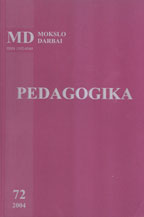Ankstyvojo muzikinio ugdymo pedocentristinių paradigmų kaita
Contemporary Children's Early Muzical Education-Pedagogical, Pedocentristic Paradigm
Author(s): Audronė Juodaitytė, Aušrinė GumuliauskienėSubject(s): Education
Published by: Vytauto Didžiojo Universitetas
Keywords: early muzical education
Summary/Abstract: In the article children's early musical education as a new pedagogical phenomenon in sociocultural, pedocentrist dimensions is revealed. Two paradigms — traditional and modern — that give sense to pedocentrist education shift are interpreted. Their essence and the nature of pedagogical reconstructions in children's early musical education are revealed. Various pedocentric theories, which are important changing the attitude of pedagogues towards a pre-school child as an active musical world participant and creator, are interpreted. The paradigm of pedocentrist traditionalism in Western Europe was considerably important in the 20th century and propagated orientating musical education towards a child's nature. Scientists based the possibilities of such education on a child's capabilities to react to the expression of musical sounds and rhythm already in infancy. Based on this newT pedagogical reconstructions were suggested, which are important to early musical education shift — musical education is important to children and its pedagogical essence consists of attitudes towards a child's world, objectives, sociocognitive, emotional expression, as a foundation for musical education. The representatives of the concept "music is the value of education" highlighted sociocognitive, cultural dimensions of early musical education, which in their essence are social and important for strengthening the status of a child as a member of a group and community. Psychotherapeutic possibilities of early musical education eliminating stress, tension are also substantiated. Radical principles of pedagogical pluralism, which are realized when a child naturally interacts with the musical world in everyday environment, are suggested on these grounds.
Journal: Pedagogika
- Issue Year: 2004
- Issue No: 72
- Page Range: 44-49
- Page Count: 5
- Language: Lithuanian

